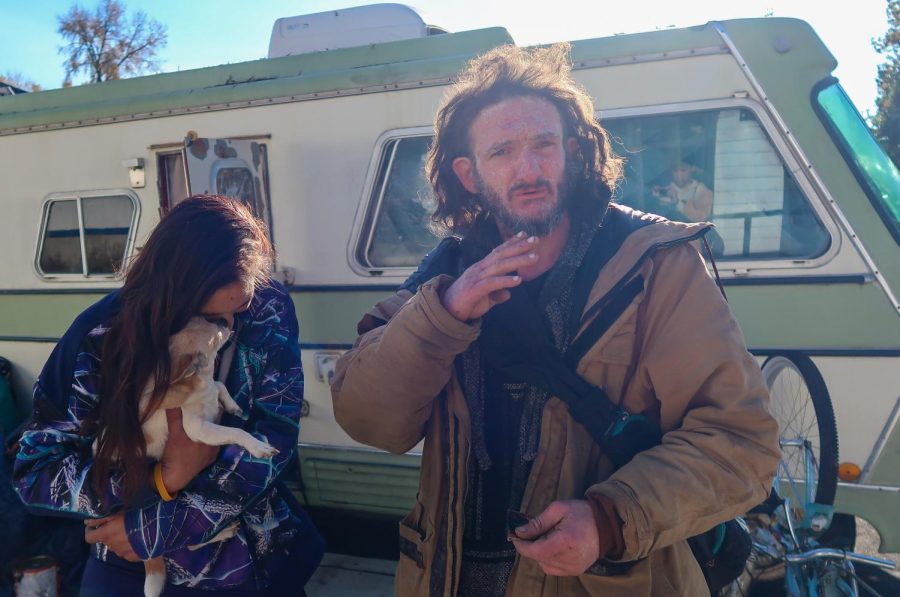Corvallis houseless community in ‘disarray,’ City of Corvallis continues campsite sweeps
Alvin Freer (right) and his partner, Carolyn Wheeler. Not to be confused with the ice cream flavor, Chunky Monkey is the dog in Wheeler’s arms. The three of them live out of the RV pictured in the image above.
January 3, 2022
For Corvallis, Ore. resident Zachary Pierce, who has been without a house for over a decade, this winter will be the first he gets to spend with a roof over his head. Others, however, are often not as lucky.
According to Pierce, getting out of the seemingly endless cycle of houselessness is something much easier said than done, espe- cially with the sweeps performed by the City of Corvallis.
Sweeps are defined as “the forced disbanding of homeless encampments on public property and the removal of both homeless individuals and their property from that area,” according to the American Civil Liberties Union of Washington.
“100% of [houseless] people don’t even know who the commissioners or the f—— mayor is, you know, all they know is that their enemy is [Corvallis] Parks and Recreation and [Oregon Department of Transportation],” Pierce said. “They’re having to move everything all over the place.”
For Pierce and many others like him, one of the only locations they can live in is by the skate park south of downtown Corvallis.
“These are really kind of considered, in my opinion, concentration camps,” Pierce said. “You have the BMX track, you know, the mead- ows and the other skate park. And nobody’s allowed to camp anywhere else. So the police know exactly where everybody’s at… it’s like a multi-crab pot. It’s something tragic; when one crab tries to get out of that pot, the other is pulling it right back down.”
There are other options for where to stay the night, such as the Corvallis Men’s Shelter, which is less than a mile away from where Pierce was camped out. However, according to Pierce, not many houseless people want to go there.
“There’s [Corvallis Housing First] and there’s the church, but nobody really knows [about them] because they will never give us a straight answer, so it becomes a ping pong effect,” Pierce said. “They’re so disconnected at every point, or they’ll send you somewhere, ‘Oh go down here and get this.’ We could spend a half a day doing that. And they’ll be like, ‘No, that’s wrong.’ Everybody’s f—— in disarray.”
While COVID-19 has certainly done its fair share of damage to the world as a whole, according to Pierce, it has at least forced the community to focus on people like him.
“COVID-19 is actually saving people’s lives right now,” Pierce said. “If that didn’t hit, the city would let us all die. COVID-19 [makes them think], ‘Oh wait, we have a renewed responsibility, because I have to look out for these people.’”
The Corvallis Men’s Shelter, located at 211 SE Chapman Pl., is now open year-round as opposed to three out of four seasons due to the ongoing COVID-19 pandemic.
“[There’s been] more need,” said Moksha Mokma, a worker for the shelter. “We’re open 12 months a year. We used to not be open in the winter… The houseless community has actu- ally been doing pretty well about vaccines. I’d say, from my limited knowledge, people willing to and people not willing to [get the vaccine] are about the same as everyone else.”
When the shelter opens for the night, workers feed and shelter up to 50 men a night, as well as providing breakfast the following morning. Mokma works during the daytime, when the shelter operates as a hygiene center.
“The hygiene center is open to anyone in the community that needs [it],” Mokma said. “People might be living out of their van, people’s water might be turned off, they need to come in and get a shower. People might not have enough clothing for their kid or clothing for themselves. People come in for supplemen- tal meals.”
Aside from short-term needs, Mokma and the organization also helps with long-term needs as well.
“Throughout the day, I do anything from helping people just be able to utilize their services, which range from showering to food to clothing,” Mokma said. “We also do collaborative care here—we connect clients with other social workers to help them find permanent housing. We help them find access to services that they might have access to, but aren’t able to access, because they need an address or need a social worker, or mental health help. So we connect them to what we call collaborative care—we try to connect them with the services that they need.”
Some houseless people prefer to get help from their own networks. One of those people is Alvin Freer, who allows individuals to enter his RV to keep warm and get what they need.
“I’m helping the homeless,” Freer said. “You know, I let them come in any time of night they need to, to get warm. I give them food. I give them blankets. I give them whatever they need to f—— do their thing.”
The Centers for Disease Control & Prevention guidelines recommend that sweeps of houseless camps should be postponed as COVID-19 continues to be an issue, stating: “If individual housing options are not available, allow people who are living unsheltered or in encampments to remain where they are.”
However, the City of Corvallis continues to perform these sweeps, according to Director of Corvallis Parks and Recreation Meredith Petit.
“The City continues to post and clean up illegal camp sites located on city property,” Petit said. “Most of the sites on city property are in city parks. Parks and Recreation staff take the lead in the posting and cleanup process for these sites. The [Corvallis Police Department] posts the camp sites and provides enforcement as needed. Parks staff clean up the camp sites after the posting. Per state law, the City is required to give a minimum of 72 hours from the time of the posting to the cleanup. Typically, we give one week, per staffing availability.”
Despite continuing the process of sweeping, the City of Corvallis has made some changes to how sweeps operate as well due to COVID-19.
“At this time the City is notifying Benton County Health of camp cleanups prior to the postings,” Petit said. “This gives Benton County Health an opportunity to do wellness or COVID-19 checks prior to the posting dates if Benton County Health determines it is necessary.”
Pierce and Freer find it frustrating that taxpayer money is spent on moving houseless camps during sweeps and not on helping them.
“When they take away our shelters, man, it’s stripping us of everything that we were coming up on, trying to make better for ourselves,” Freer said. “And then it’s restarting us; they’re holding us down into a position where we can’t get back up. We can’t do better for ourselves.”











































































































